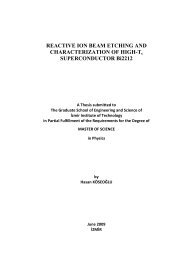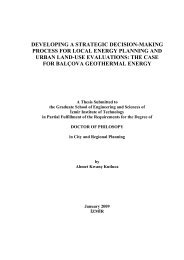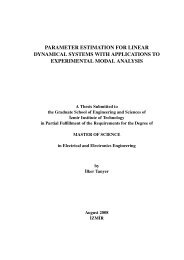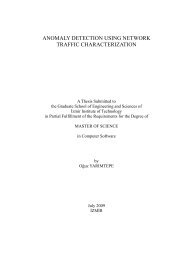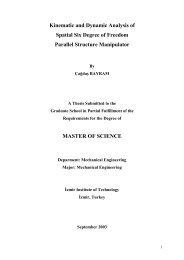a critical evaluation on the concept of justice in planning process
a critical evaluation on the concept of justice in planning process
a critical evaluation on the concept of justice in planning process
You also want an ePaper? Increase the reach of your titles
YUMPU automatically turns print PDFs into web optimized ePapers that Google loves.
a)to <strong>the</strong> greatest benefit <strong>of</strong> least advantaged, c<strong>on</strong>sistent with <strong>the</strong> just sav<strong>in</strong>g pr<strong>in</strong>ciple,<br />
and<br />
b)attached to <strong>of</strong>fices and positi<strong>on</strong>s open to all under c<strong>on</strong>diti<strong>on</strong>s <strong>of</strong> fair equality <strong>of</strong><br />
opportunity" (Rawls;1971; 302)<br />
Regard<strong>in</strong>g <strong>the</strong>se pr<strong>in</strong>ciples atta<strong>in</strong>ed, <strong>the</strong> first priority rule is, <strong>in</strong> words <strong>of</strong> Rawls,<br />
“priority <strong>of</strong> liberty”. He implies that <strong>the</strong>re exist two c<strong>on</strong>diti<strong>on</strong>s <strong>in</strong> restricti<strong>on</strong> <strong>of</strong> liberties<br />
<strong>in</strong> <strong>the</strong> name <strong>of</strong> liberties.<br />
(a) a less extensive liberty must streng<strong>the</strong>n <strong>the</strong> total system <strong>of</strong> liberty shared by all;<br />
(b)a less than equal liberty must be acceptable to those with <strong>the</strong> lesser liberty<br />
(Rawls;1971; 302).<br />
Accord<strong>in</strong>g to Rawls, implementati<strong>on</strong> <strong>of</strong> <strong>the</strong>se pr<strong>in</strong>ciples is important po<strong>in</strong>t for a<br />
good/fair society. For this reas<strong>on</strong>, Rawls, who is <strong>in</strong> search <strong>of</strong> a practiced <strong>justice</strong> not <strong>in</strong><br />
producti<strong>on</strong> relati<strong>on</strong>s but <strong>in</strong> distributi<strong>on</strong> relati<strong>on</strong>s, has a <strong>the</strong>ory about how <strong>justice</strong><br />
pr<strong>in</strong>ciples will be applied and his four-stage sequence proposal takes place <strong>in</strong> this<br />
<strong>the</strong>ory. First <strong>on</strong>e <strong>of</strong> <strong>the</strong>se stages is selecti<strong>on</strong> <strong>of</strong> <strong>the</strong> sides at orig<strong>in</strong>al positi<strong>on</strong>, <strong>the</strong> <strong>justice</strong><br />
pr<strong>in</strong>ciple and <strong>the</strong>ir adopti<strong>on</strong> <strong>of</strong> it. In <strong>the</strong> sec<strong>on</strong>d stage sides are oriented toward a<br />
c<strong>on</strong>stituti<strong>on</strong>al agreement. In this stage <strong>the</strong> c<strong>on</strong>stituti<strong>on</strong>al powers <strong>of</strong> <strong>the</strong> adm<strong>in</strong>istrati<strong>on</strong><br />
and basic rights <strong>of</strong> citizens are determ<strong>in</strong>ed. In c<strong>on</strong>stituti<strong>on</strong>al stage priority is given to <strong>the</strong><br />
liberty and freedom. Accord<strong>in</strong>g to Rawls this priority and <strong>process</strong>; “it guarantees<br />
selecti<strong>on</strong> <strong>of</strong> a system guarantee<strong>in</strong>g moral liberty, and thought, belief and religious<br />
freedom <strong>in</strong> c<strong>on</strong>stituti<strong>on</strong>al agreement” (Hünler, 1997, 57-65). In <strong>the</strong> third stage; <strong>the</strong><br />
<strong>justice</strong> <strong>of</strong> laws and policies are determ<strong>in</strong>ed. In <strong>the</strong> organizati<strong>on</strong> <strong>of</strong> ec<strong>on</strong>omic <strong>justice</strong> <strong>in</strong><br />
o<strong>the</strong>r words <strong>in</strong> <strong>the</strong> distributi<strong>on</strong> <strong>justice</strong> an arrangement where distributi<strong>on</strong> results are just<br />
is proposed dur<strong>in</strong>g legislati<strong>on</strong> period. The pr<strong>in</strong>ciple <strong>of</strong> this arrangement is mak<strong>in</strong>g <strong>the</strong><br />
least advantaged people reach to social m<strong>in</strong>imum level (Rawls, 1971, 276). In <strong>the</strong> last<br />
and fourth stage is <strong>the</strong> applicati<strong>on</strong> <strong>of</strong> rules <strong>in</strong>to <strong>the</strong> situati<strong>on</strong>s and observati<strong>on</strong> <strong>of</strong> <strong>the</strong>m by<br />
<strong>the</strong> citizens <strong>in</strong> general. In <strong>the</strong> fourth stage which is <strong>the</strong> judicial stage <strong>the</strong> c<strong>on</strong>stituti<strong>on</strong>al<br />
and legislati<strong>on</strong> stages are c<strong>on</strong>sidered at <strong>the</strong> po<strong>in</strong>ts <strong>of</strong> c<strong>on</strong>science and civilian<br />
disobedience. These last three stages are <strong>the</strong> <strong>on</strong>es which procedural <strong>justice</strong> is practiced<br />
and show how <strong>justice</strong> functi<strong>on</strong>s at <strong>the</strong> disidealistic situati<strong>on</strong>s.<br />
28



